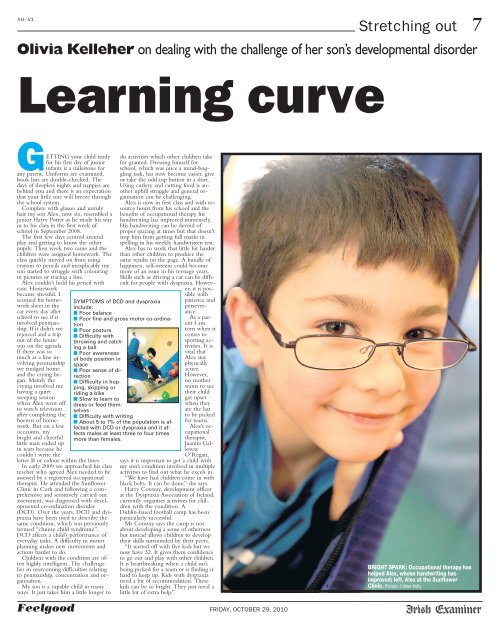Feelgood - Irish Examiner
Feelgood - Irish Examiner
Feelgood - Irish Examiner
You also want an ePaper? Increase the reach of your titles
YUMPU automatically turns print PDFs into web optimized ePapers that Google loves.
TERAPROOF:User:jaycarcioneDate:27/10/2010Time:16:45:46Edition:29/10/2010<strong>Feelgood</strong>XH2910Page:7<br />
Zone:XH<br />
XH - V1<br />
Stretching out<br />
Olivia Kelleher on dealing with the challenge of her son’s developmental disorder<br />
Learning curve<br />
7<br />
GETTING your child ready<br />
for his first day of junior<br />
infants is a milestone for<br />
any parent. Uniforms are examined,<br />
book lists are double-checked. The<br />
days of sleepless nights and nappies are<br />
behind you and there is an expectation<br />
that your little one will breeze through<br />
the school system.<br />
Complete with glasses and unruly<br />
hair my son Alex, now six, resembled a<br />
junior Harry Potter as he made his way<br />
in to his class in the first week of<br />
school in September 2008.<br />
The first few days centred around<br />
play and getting to know the other<br />
pupils. Then week two came and the<br />
children were assigned homework. The<br />
class quickly moved on from using<br />
crayons to pencils and inexplicably my<br />
son started to struggle with colouring<br />
in pictures or tracing a line.<br />
Alex couldn’t hold his pencil with<br />
ease. Homework<br />
became stressful. I<br />
scanned his homework<br />
sheet in the<br />
car every day after<br />
school to see if it<br />
involved penmanship.<br />
If it didn’t we<br />
rejoiced and a trip<br />
out of the house<br />
was on the agenda.<br />
If there was so<br />
much as a line involving<br />
penmanship<br />
we trudged home<br />
and the crying began.<br />
Mainly the<br />
crying involved me<br />
having a quiet<br />
weeping session<br />
when Alex went off<br />
to watch television<br />
after completing the<br />
horrors of homework.<br />
But on a few<br />
occasions, my<br />
bright and cheerful<br />
little man ended up<br />
in tears because he<br />
couldn’t write the<br />
letter B or colour within the lines.<br />
In early 2009 we approached his class<br />
teacher who agreed Alex needed to be<br />
assessed by a registered occupational<br />
therapist. He attended the Sunflower<br />
Clinic in Cork and following a comprehensive<br />
and sensitively carried out<br />
assessment, was diagnosed with developmental<br />
co-ordination disorder<br />
(DCD). Over the years, DCD and dyspraxia<br />
have been used to describe the<br />
same condition, which was previously<br />
termed “clumsy child syndrome”.<br />
DCD affects a child’s performance of<br />
everyday tasks. A difficulty in motor<br />
planning makes new movements and<br />
actions harder to do.<br />
Children with the condition are often<br />
highly intelligent. The challenge<br />
lies in overcoming difficulties relating<br />
to penmanship, concentration and organisation.<br />
My son is a capable child in many<br />
ways. It just takes him a little longer to<br />
<strong>Feelgood</strong><br />
do activities which other children take<br />
for granted. Dressing himself for<br />
school, which was once a mind-boggling<br />
task, has now become easier, give<br />
or take the odd top button in a shirt.<br />
Using cutlery and cutting food is another<br />
uphill struggle and general organisation<br />
can be challenging.<br />
Alex is now in first class and with resource<br />
hours from his school and the<br />
benefits of occupational therapy his<br />
handwriting has improved immensely.<br />
His handwriting can be devoid of<br />
proper spacing at times but that doesn’t<br />
stop him from getting full marks in<br />
spelling in his weekly handwritten test.<br />
Alex has to work that little bit harder<br />
than other children to produce the<br />
same results on the page. A bundle of<br />
happiness, self-esteem could become<br />
more of an issue in his teenage years.<br />
Skills such as driving a car can be difficult<br />
for people with dyspraxia. However,<br />
it is possible<br />
with<br />
patience and<br />
perseverance.<br />
As a parent<br />
I am<br />
torn when it<br />
comes to<br />
sporting activities.<br />
It is<br />
vital that<br />
Alex stay<br />
physically<br />
active.<br />
However,<br />
no mother<br />
wants to see<br />
their child<br />
get upset<br />
when they<br />
are the last<br />
to be picked<br />
for teams.<br />
Alex’s occupational<br />
therapist,<br />
Juanita Galloway<br />
O’Regan,<br />
says it is important to get a child with<br />
my son’s condition involved in multiple<br />
activities to find out what he excels in.<br />
“We have had children come in with<br />
black belts. It can be done,” she says.<br />
Harry Conway, development officer<br />
at the Dyspraxia Association of Ireland,<br />
currently organises activities for children<br />
with the condition. A<br />
Dublin-based football camp has been<br />
particularly successful.<br />
Mr Conway says the camp is not<br />
about developing a sense of otherness<br />
but instead allows children to develop<br />
their skills surrounded by their peers.<br />
“It started off with five kids but we<br />
now have 32. It gives them confidence<br />
to go out and play with other children.<br />
It is heartbreaking when a child isn’t<br />
being picked for a team or is finding it<br />
hard to keep up. Kids with dyspraxia<br />
need a bit of accommodation. These<br />
kids can be so bright. They just need a<br />
little bit of extra help.”<br />
SYMPTOMS of DCD and dyspraxia<br />
include:<br />
■ Poor balance<br />
■ Poor fine and gross motor co-ordination<br />
■ Poor posture<br />
■ Difficulty with<br />
throwing and catching<br />
a ball<br />
■ Poor awareness<br />
of body position in<br />
space<br />
■ Poor sense of direction<br />
■ Difficulty in hopping,<br />
skipping or<br />
riding a bike<br />
■ Slow to learn to<br />
dress or feed themselves<br />
■ Difficulty with writing<br />
■ About 5 to 7% of the population is affected<br />
with DCD or dyspraxia and it affects<br />
males at least three to four times<br />
more than females.<br />
FRIDAY, OCTOBER 29, 2010<br />
BRIGHT SPARK: Occupational therapy has<br />
helped Alex, whose handwriting has<br />
improved; left, Alex at the Sunflower<br />
Clinic. Picture: Cillian Kelly












